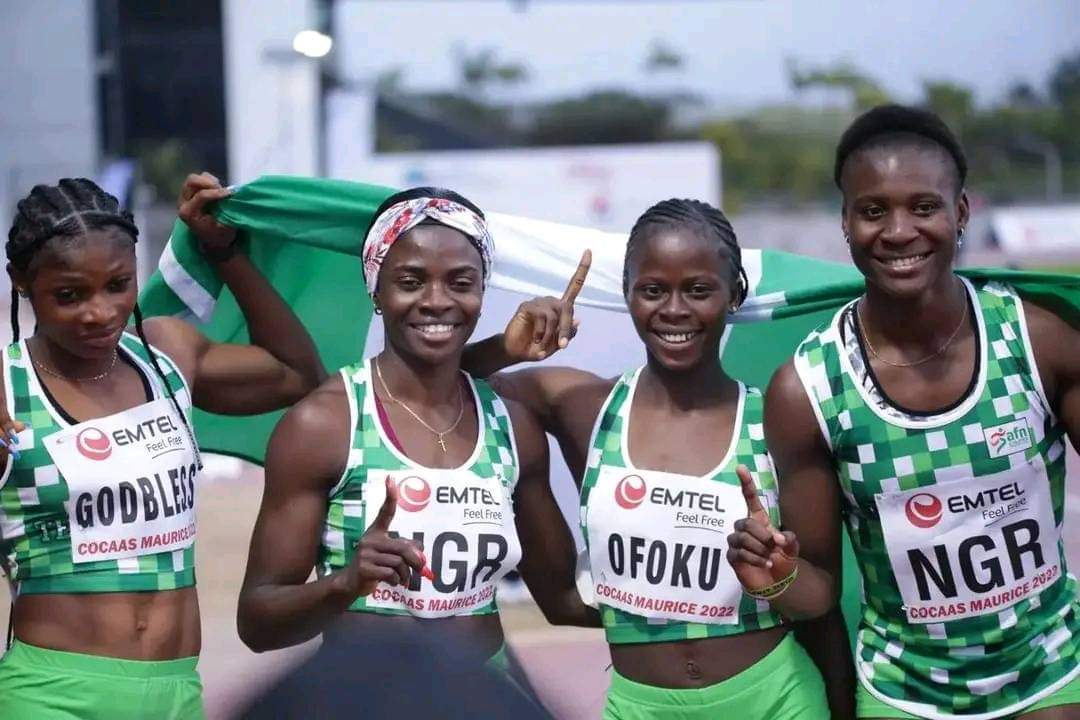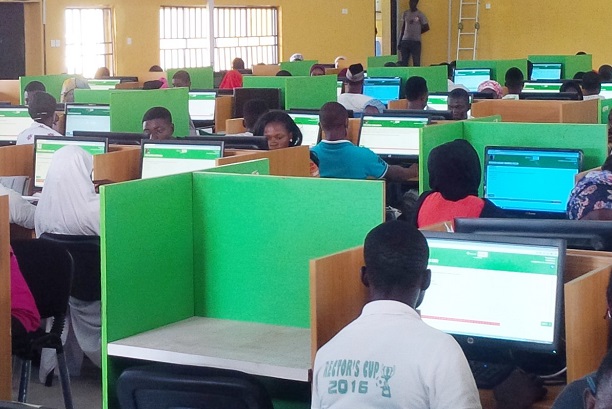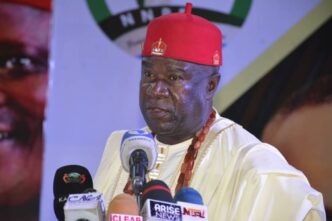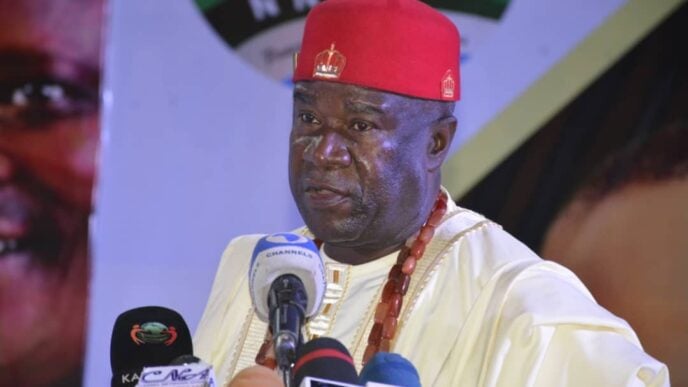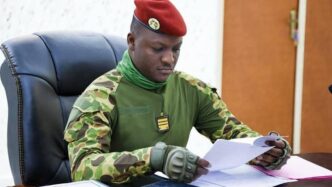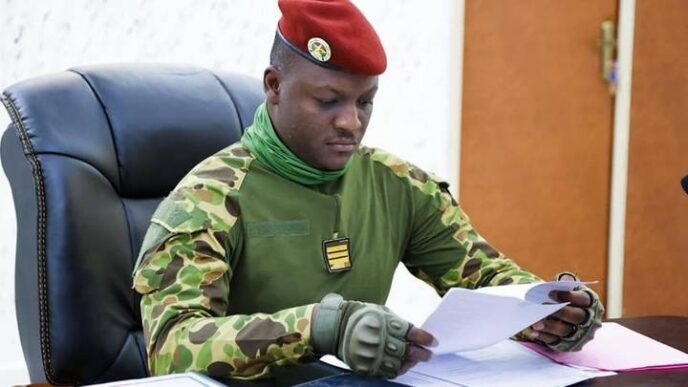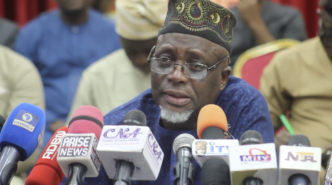Tobi Amusan (second from left) was listed to represent Nigeria in the women's 4x100m at the World Relays
Nigeria’s sports sector, once a source of national pride, and joy for an average Nigerian, has been plagued by chronic administrative inefficiencies, corruption, ineptitude, and gross negligence. The Athletics Federation of Nigeria (AFN) exemplifies these failures, with repeated cases of mismanagement or administrative gaffe —from failing to register qualified athletes for major competitions, to last-minute visa processing debacle, despite having a foreknowledge of what needs to be done, when and how. Despite these glaring lapses, there is little to no accountability, allowing the cycle of incompetence and lack of professionalism to persist. This piece asks: who is being economical with the truth, between the AFN and the Chinese embassy. It also examines the depth of these failures, their consequences, and actionable solutions to restore Nigeria’s sporting glory.
The AFN went to town last week to announce to the world, saying their athletes would not be able to attend the forthcoming World Relay, billed for Guangzhou, China. Reason? They claimed there was a delay in the processing of visa applications for the Nigerian contingents. They claimed to have put in the application since February, but that the Chinese embassy in Nigeria refused to process and grant a Visa on time, until about 48 hours to the commencement of the event — the exact amount of time needed to travel from Nigeria to the venue. The Director-General of the National Sports Commission (NSC) Bukola Olopade corroborated the AFN’s statement. They insist that it would pose a logistic nightmare for the team. Therefore, they would not be attending.
Reports have it that, it’s not the first time Nigeria has been affected by visa issues for World Athletics events this year. In March, Nigeria’s contingent to the World Relays in Nanjing, China, was also depleted by the same issues, leaving only shot put thrower Chukwuebuka Enekwechi as Nigeria’s only athlete at the event. Nigeria also missed the 2021 World Relays in Poland over visa issues.
But a day after pinning the whole thing in the recent debacle on the Chinese embassy, an official embassy came out to state that the AFN was only being economical with the truth, saying they received the application on the 6th day of May 2025, as opposed to the claim of February, and that they gave it an expedited processing. After guiding them on the required documents, they still went ahead to present incorrect or inadequate documents. That notwithstanding, the application was granted two days after it was received.
Advertisement
The embassy went further to say that, the governing-body was only being economical with the truth. As at the time I was punching my keypad for this piece, there had been no rebuttal of the embassy’s claim by the AFN. So where lies the truth, between the AFN and the Chinese embassy? You may use your tongue to count your teeth.
Whatever your conclusion is, the AFN have a record, cataloguing ugly incidents like this. Some of them will be highlighted in the subsequent paragraphs. Meanwhile, the following are some issues identified with most Sports Federations in Nigeria, especially the AFN.
Chronic Administrative Failures in Nigerian Sports.
Advertisement
- Failure to Register Qualified Athletes:
One of the most egregious cases involves sprinter, Favour Ofili, who was inexplicably left off the entry list for the women’s 100m event at the Paris 2024 Olympics despite qualifying. This administrative blunder robbed her of a chance to compete, leaving her in tears and damaging her career prospects. Similarly, hammer thrower, Annette Echikunwoke, was disqualified from the Tokyo 2020 Olympics due to the AFN’s failure to arrange mandatory drug tests. She later switched allegiance to the U.S. and won a silver medal at the 2024 Olympics—a medal Nigeria lost due to sheer negligence.
- Visa Processing Delays and Last-Minute Withdrawals:
The recent World Relays Championship in Guangzhou, China, saw Nigeria’s withdrawal due to visa delays. While the AFN blamed Chinese authorities for bureaucratic bottlenecks, the Chinese Embassy countered that Nigeria submitted incomplete documents too late, leaving insufficient time for processing. This mirrors past incidents where Nigerian athletes missed competitions due to administrative lapses, further tarnishing the country’s reputation in global sports.
- Corruption and Favoritism in Team Selection:
Athletes have repeatedly alleged that bribes and connections, rather than merit, influence team selections. Former Super Eagles player, Chinedu Obasi, alleged that, he was asked to pay $10,000 to be included in Nigeria’s 2014 World Cup squad in Brazil. Although it was debunked by an ex-international, Daniel Amokachi who was, then, one of coach Stephen Keshi’s assistants. Meanwhile, the same ex-international, Amokachi, also alleged that young players were extorted for spots in the U-17 team. Such practices discourage genuine talent and erode trust in the system. Another ugly incident was when one of the sponsors of the Tokyo 2020 Olympic Games gave out smartphones to each of the athletes who qualified for the games. Rather than distribute to those who are the designated beneficiaries, officials in the Nigerian contingents were trying to corner some for themselves. Until the athletes cried out, before they backed down. The scandal was one of the most embarrassing moments corrupt officials of Sports administration in Nigeria have ever subjected themselves to, in recent memories.
- Lack of Basic Support for Athletes:
At the Paris 2024 Olympics, cyclist Ese Ukpeseraye had to borrow a bicycle from the German team because Nigerian officials failed to provide one, citing “last-minute” participation notices. Not being proactive enough. This echoes past incidents where athletes lacked proper kits, training facilities, or even food, as former captain, Mikel Obi disclosed during the 2016 Olympics.
Advertisement
Why Does This Inefficiency Persist?
Absence of Accountability:
Despite repeated scandals, no sports administrator has faced sanctions. Nobody has ever been queried, let alone, suspended or penalised in any way. The AFN and Nigerian Olympics Committee (NOC) operate with impunity, knowing there will be no consequences for the crass incompetence, as far as the NSC or any Ministry is concerned.
Political Imposition, instead of Meritocracy:
Advertisement
Sports federations are often led by politically connected individuals rather than qualified professionals. This leads to poor decision-making, mismanagement of funds, and lack of long-term planning. The whole arena reels of lack of capacity.
Neglect of Grassroots Development:
Advertisement
Nigeria’s once-thriving youth competitions have disappeared, leaving no structured pathway for talent discovery., and nurturing of same, to stardom. Local coaches lament, the decay of facilities and lack of support for budding athletes, lack of capacity-building programmes for the coaches.
The question now is, “How Can Nigeria Fix Its Broken Sports Administration?”
Advertisement
- Enforce Strict Accountability Measures:
Independent audits of all sports federations to expose financial mismanagement. Suspension or dismissal of officials responsible for administrative failures (e.g., Ofili’s omission, visa delays).
“Public apologies and compensation” for athletes wronged by negligence.
Advertisement
- Depoliticize Sports Governance:
“Merit-based appointments” for federation heads, not political loyalists. Let there be an autonomous sports bodies”, insulated from government, and political interference.
iii. Improve Planning and Logistics:
Ensure, there is an early visa applications, with complete documentation to avoid last-minute withdrawals. Contingency plans for equipment, travel arrangement, and athlete welfare at international events.
- Revive Grassroots Sports Programs:
Restore youth competitions, to discover and nurture talents early. Catch-Them-Young, if you like. In addition, ensure that there is Public-private partnership, to upgrade dilapidated facilities.
- Athlete-Centric Policies:
Entrench a transparent selection processes, to eliminate bribery and favoritism. Better funding for training, medical care, and exposure to international competitions.
In conclusion, Nigeria’s sports decline is not due to a lack of talent but to systemic administrative failure. The cases of Ofili, Echikunwoke, Ukpeseraye, and the recent failure in applying for visa on time, highlight how negligence destroys careers and national pride. Without urgent reforms—including accountability, depoliticization, and grassroots investment—Nigeria will continue to lose talents to other nations and suffer humiliation on the global stage.
The time for action or inaction without consequence is over. Nigerian sports need a radical departure from the past and the best time to match words with action. Sports administration at any level goes beyond the ability to procure an A-grade polo, with a crest of a European club. A flowing “Baba ń Riga” will not cut it either. Rather, it is about intellectual capacity, patriotic zeal and passion to, positively, impact the industry. It is not an avenue for personal aggrandizement.
Abubakar writes from Ilorin, Kwara state. He can be reached via 08051388285 or [email protected]
Views expressed by contributors are strictly personal and not of TheCable.

